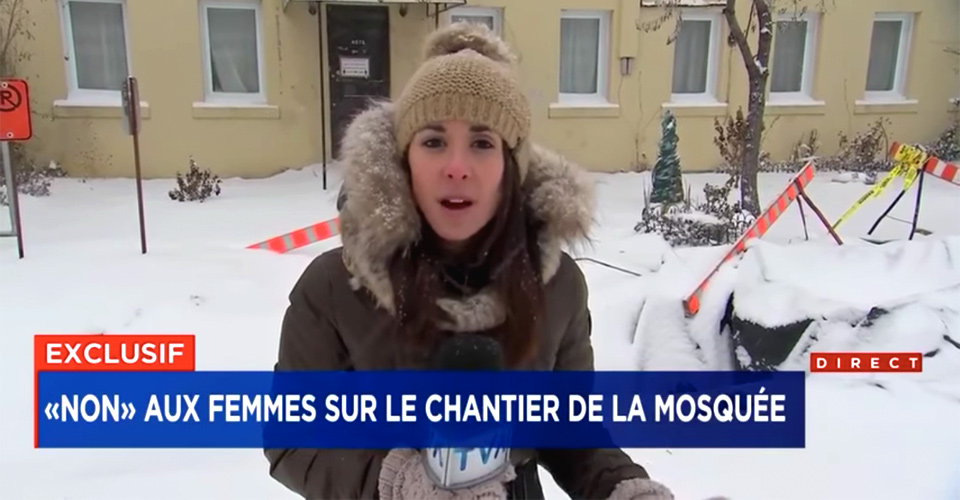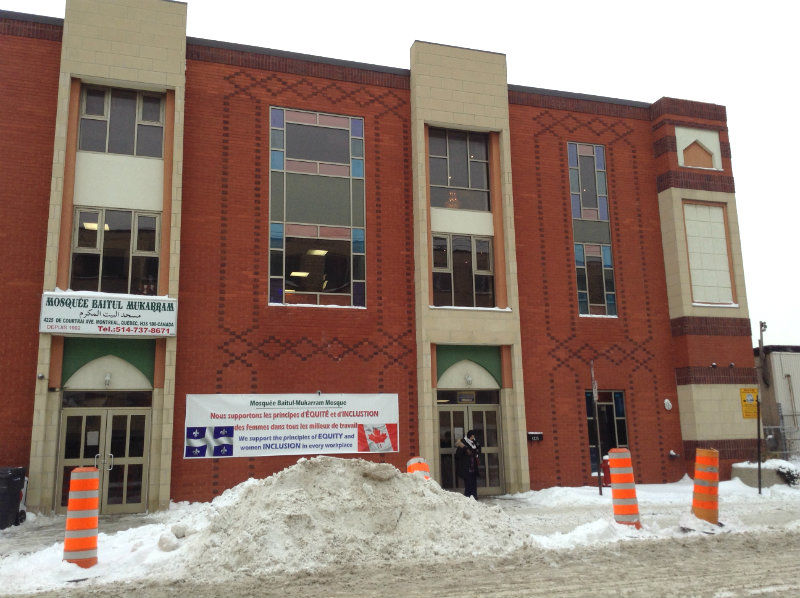
As the number of shares on the questionable article grew, Maxime Fiset took a step back.
Fiset, a former right-wing extremist, is a project associate at the Montreal-based Centre for the Prevention of Radicalization Leading to Violence, which monitors radicalization in Quebec across the political and religious spectrums. It’s a job that necessitates a finely tuned bullshit detector — and that detector was already buzzing.
He shared the story with a caveat: “If it’s true…”
The December 12 story, written by journalist Marie-Pier Cloutier for the right-leaning network TVA, alleged that two Montreal mosques had “put pressure” on an electrical contractor working on a nearby site to keep female employees from working there on Fridays, the Muslim day of prayer. No female employees, nor any women, were directly quoted in the original story.
The article, which is no longer available on TVA Nouvelles’ website, claimed that the provision was written “black on white” in a contract. The piece also went further, alleging that five female construction workers had lost wages in the past few weeks due to the agreement, and that one woman had to work “accompanied by a male [employee]” for her own safety.
The story set off one of Quebec’s biggest cultural and political tripwires — the relationship between the province’s secular white francophone majority and its Muslim community.
“This is a question that has kept coming up ever since the Bouchard-Taylor commission on reasonable accommodation in 2006,” Fiset says, referring to a controversial provincial commission that found Quebecers were “facing the need to adapt” on diversity issues. The years that followed saw the Parti Québécois government lose an electoral gamble over a “Charter of Quebec Values” which would have forbidden public servants from wearing religious symbols, and saw the federal New Democratic Party lose dozens of seats in the province after hesitating to take a firm stand against the wearing of the niqab during citizenship ceremonies (an accommodation called for by one woman in the Toronto area).
More recently, a small group of villagers outside of Quebec City rejected, in a referendum, a zoning provision for a Muslim cemetery. Quebec’s governing Liberals recently attempted to gain ground on their nationalist rivals by turning a “commission on systemic racism” into a commission on immigrant labour, and by passing Bill 62, forbidding people from covering their faces while accessing public services, widely seen as another swipe at veiled women.
“A lot of these [reasonable accommodation debates] are linked to controversial media coverage,” says Fiset. “Even when something very small happens — say, a sugar shack changes its menu to accommodate people who don’t eat pork — they change it into a news event, and then it gets on the political agenda.”
Case in point: as soon as the TVA story broke, the provincial labour minister, Dominique Viens, called for an investigation of “an act which, if true, is totally unacceptable.”
Reaction on social media was swift and vehement. The leaders of the two mosques, the Baitul Mukarram Mosque and the Ahlilbait Mosque, were bombarded with threats. La Meute and Storm Alliance, two far-right nationalist groups, announced plans to rally in front of the mosques on Friday, December 15, during weekly prayers.
And then, everything began to fall apart.
Only hours after the original post, a sharp-eyed HuffPost Québec reporter noticed the story’s first gaping hole — the original piece contained no comment from either mosque.
“There are two big problems here,” says Guillaume Lavallée, a journalism professor at the Université du Québec à Montréal, who used the incident as a teachable moment in a recent class. “One problem is the journalist alleging she has written proof and our never seeing the written proof. The second problem is that in a situation like that, you can’t run a story based on one statement and wait for other statements to come after…the journalist didn’t speak to the main people concerned, the people at the mosque.”
“Especially in such a tense context, with the debate over reasonable accommodation and with [the Quebec City mosque shooting] last January, you need to be doubly vigilant,” Lavallée says.
Over the following day, La Presse, Le Devoir, CBC, the provincial government, and the Quebec Construction Commission launched their own investigations. A representative of Quebec’s electrical services commission told CBC that he spoke with representatives of the contractor, who said the mosques never asked them to keep women off the site, although an agreement was reached to limit construction noise during prayer time. Lyne Laperrière, head of the construction division of the Centrale des syndicats démocratiques, told CBC a request might have come from a neighbour, although “why [the contractor] listened to a demand from a neighbour, I don’t have that answer.”
The construction commission’s response, after a two-day-long investigation, was categorical: “Absolutely nothing indicates that the mosques’ representatives asked for any accommodation as concerns women on the site.”
“We have no idea where these allegations came from,” said mosque spokesperson Brahim Ouaziz, at a press conference called on Friday. “We don’t have any problem with women working in any sector.” At least one female construction worker was seen working on the nearby site that day.
For Lavallée, who also did graduate work on Islamic philosophy, the story didn’t hold water. “In Islam, like in some other religions, men and women are separated during prayers…but from there to demanding that there be no women on the site…I didn’t understand that.”
Two days after the original report, TVA walked back the story, referring to a “significant imbroglio between sources.”
They issued a more direct apology the next morning and said in a press release that an internal investigation was planned into how the segment was researched and reported. “The versions of events that we received from our original sources have changed since Thursday,” the network said.
A call for comment was not returned.
La Meute cancelled its plans to rally in front of the mosques; Storm Alliance asked its members, if they chose to attend the rally, not to wear its colours or insignia. “This whole thing has turned into a mess and those who show up are going to be labelled idiots… for having believed so-called fake news,” Storm Alliance leader Dave Treggett wrote.
However, by this point, the toothpaste was out of the tube. Rebel Media picked up the story, alleging a “no-go zone” for women in Montreal.
“If you run a news organization, it’s hard to admit you screwed up, but because they waited as long as they did to apologize, the story’s going to keep rolling,” says Lavallée.
“How do you expect us to believe what an Islamic [sic] says?” someone wrote on the Facebook page of one of the mosques. “They’re all shit disturbers.”

As Ouaziz and Immigration Minister David Heurtel addressed journalists and worshipers inside the Baitul Mukarram Mosque, accompanied by a heavy police presence, about 40 protesters gathered outside, undeterred by the questions surrounding the story. Some were unaffiliated; others were linked with a group called the Canadian Coalition of Concerned Citizens.
“I don’t care if it’s true or not,” said one woman, who gave her name as Isabelle. “The Muslim community might be testing the waters to see what we’ll stand for. If everyone goes home because the story might be false, it will show them how passive we are.”
Coincidentally, at the height of the mosque speculation, the US-based magazine Pacific Standard ran a story about new research from psychologists at Belgium’s Ghent University, finding that the effects of fake news “never completely wore off” from participants in a study, even after they were exposed to new information. Misinformation, the study’s authors found, “cannot simply be undone by pointing out that this information is incorrect.” The effect was more pronounced in readers with lower levels of cognitive ability.
“The average person doesn’t construct their worldview around facts, especially when a piece of news confirms their prejudices or their existing expectations,” Fiset says. “There’s no way to repair this damage. In fact, there are new conspiracy theories going around that involve the mosque forcing the government to retract.”
On Wednesday of the following week, about 100 antiracist protesters gathered outside TVA’s Montreal headquarters, accusing the station of “fanning the flames of hatred” against the Muslim community, the Montreal Gazette reported.
The next evening, December 21, the station broadcast a further clarification of what had happened, stating that employees working on the site had “misinterpreted” a verbal request from a city engineer to respect the beliefs of people in and around the mosque. TVA reiterated the construction commission’s conclusion that the controversy was “the result of a combination of management problems on the site and commmunication problems among the different parties involved in the subcontracting chain.”
“We shouldn’t be alarmist just because of a few people who say wild things,” says Fiset, “but I understand the malaise and fear of the Muslim community. This is a very sensitive issue and the consequences could be very serious.”
Top image from the original news report, as preserved on YouTube.
Updated on Dec. 22, 2017, at 10:47 a.m. EST to include news of the anti-TVA protest, as well as the network’s further explanation of how the erroneous story came about.
Correction (March 8, 2018, at 10:27 a.m.): Maxime Fiset is a project associate at Montreal’s Centre for the Prevention of Radicalization Leading to Violence. This article originally misstated his title.